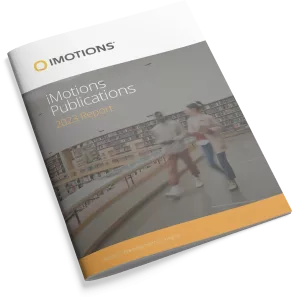-
Estimating Developers’ Cognitive Load at a Fine-grained Level Using Eye-tracking Measures
The comprehension of source code is a task inherent to many software development activities. Code change, code review and debugging are examples of these activities that depend heavily on developers’ understanding of the source code. This ability is threatened when developers’ cognitive load approaches the limits of their working memory, which in turn affects their […]
-
Eye Tracking on Shopfloors for User Engagement with Automation
Mixed Reality (MR) is becoming an integral part of many context-aware industrial applications. In maintenance and remote support operations, the individual steps of computer-supported (cooperative) work can be defined and presented to human operators through MR headsets. Tracking of eye movements can provide valuable insights into a user’s decision-making and interaction processes. Thus, our overarching […]
-
Emotional Empathy and Facial Mimicry of Avatar Faces
We explore the extent to which empathetic reactions are elicited when subjects view 3D motion-capture driven avatar faces compared to viewing human faces. Through a remote study, we captured subjects’ facial reactions when viewing avatar and humans faces, and elicited self reported feedback regarding empathy. Avatar faces varied by gender and realism. Results show no […]
-
Exploiting Micro Facial Expressions for More Inclusive User Interfaces
Current image/video acquisition and analysis techniques allow for not only the identification and classification of objects in a scene but also more sophisticated processing. For example, there are video cameras today able to capture micro facial expressions, namely, facial expressions that occur in a fraction of a second. Such micro expressions can provide useful information […]
-
Archetypal physiological responses to prolonged wakefulness
Acute sleep deprivation is a common workplace and lifestyle hazard known to affect physiological and cognitive performance. Previous research emphasizes the effect that sleep deprivation has on cognitive performance and often correlates changes in physiological parameters to measured performance. One potential problem with this approach is that there is some ambiguity about the true physiological […]
-
Can Eye Tracking Identify Prognostic Markers for Learning Disabilities? A Preliminary Study
Eye tracking is a promising technology offering objective metrics quantifying visual attention in various application fields. The employment in people with specific learning disabilities (SLDs), who reportedly manifest long-term functional social, emotional, and behavioral difficulties, provided well understandings of their visual attention, detecting cognitive processing mechanisms regarding specific SLD patterns. This study focuses on investigating […]
-
Electrodermal Activity Evaluation of Player Experience in Virtual Reality Games: A Phasic Component Analysis
Electrodermal activity (EDA) is considered to be an effective metric for measuring changes in the arousal level of people. In this paper, the phasic component of EDA data from players is analyzed in relation to their reported experience from a standardized questionnaire, when interacting with a couple of virtual reality games that featured two different […]
-
Statistical emotion control: Comparing intensity and duration of emotional reactions based on facial expressions
The aim is to develop an intelligent automatic facial expression recognition and emotion analysis (AFEREA) algorithm that, first, characterizes the time-based raw signals of biosensors in quantitative indicators of the emotional state of the individuals participating in an experiment and, second, compares the emotional reactions across them in terms of intensity and duration. The proposed […]
-
What happens to your body during learning with computer-based environments? Exploring negative academic emotions using psychophysiological measurements
This explorative study aims to examine if electrodermal activity (EDA) and heart rate (HR) are appropriate measures for identifying and monitoring academic emotions during learning in computer-based learning environments (CBLEs). Understanding learners’ emotions while using CBLEs, allows improving the design of CBLEs. Therefore, we collected EDA, HR, and self-report data from 32 participants to measure […]
-
Cognitive and emotional engagement while learning with VR: The perspective of multimodal methodology
This study uses a multimodal data analysis approach to provide a more continuous and objective insight into how students’ engagement unfolds and impacts learning achievements. In this study, 61 nursing students’ learning processes with a virtual reality (VR)-based simulation were captured by psycho-physiological data streams of facial expression, eye-tracking, and electrodermal activity (EDA) sensors, as well […]
Research Report 2023
In-depth look at the scientific landscape as powered by iMotions software, showcasing groundbreaking research and the impact of our tools in various scientific and industrial fields.

Share Your Research

850+ universities worldwide with an iMotions human behavior lab
73 of the top 100 highest ranked universities
710+ published research papers using iMotions
iMotions is used for some of the most interesting human behavior research studies carried out by top researchers around the world. Contact us to have your publication featured here.
The authors of these publications have used iMotions as a software tool within their research.
“Software should be cited on the same basis as any other research product such as a paper or a book; that is, authors should cite the appropriate set of software products just as they cite the appropriate set of papers” (Katz et al., 2020).
We therefore encourage you to cite the use of iMotions where appropriate.
How to cite iMotions
APA
iMotions (10), iMotions A/S, Copenhagen, Denmark, (2024).
Note: adjust the version and year where relevant.
5 Most Popular Blogs
Learn How to Conduct Human Behavior Research with iMotions
Publications
Read publications made possible with iMotions
Blog
Get inspired and learn more from our expert content writers
Newsletter
A monthly close up of latest product and research news





